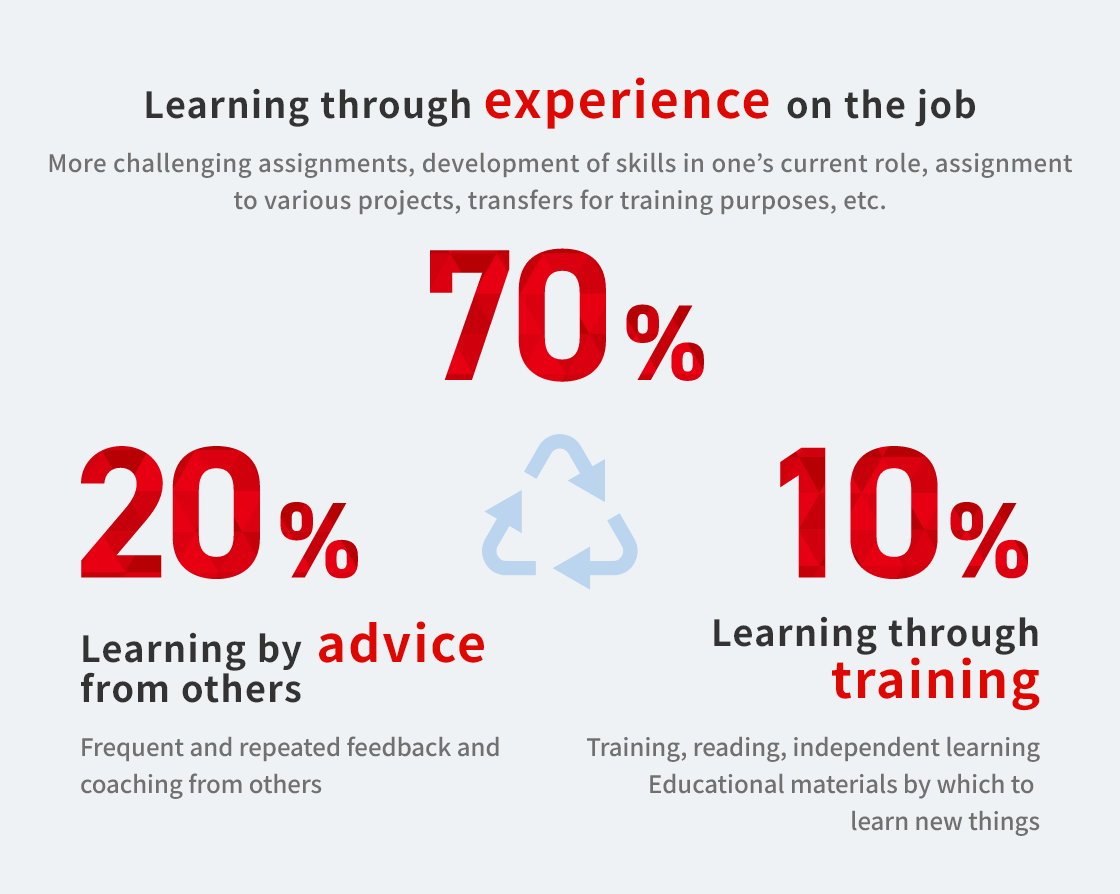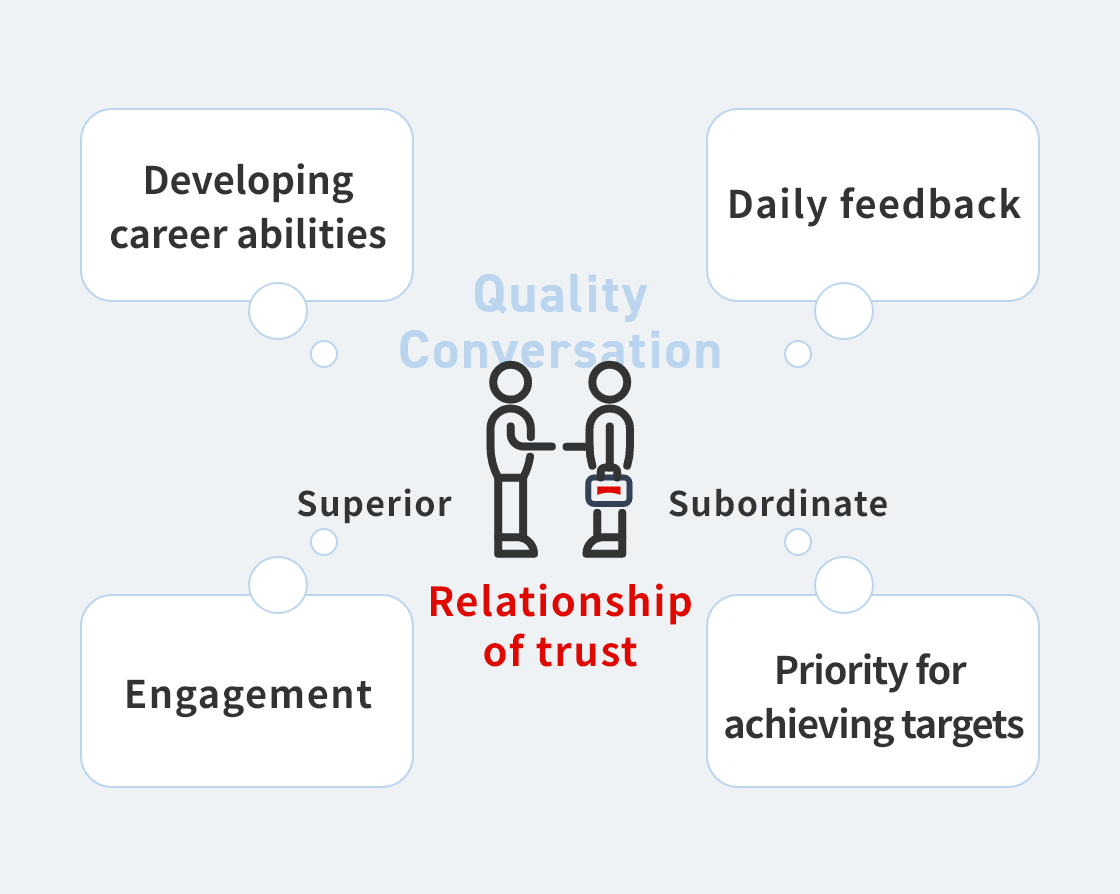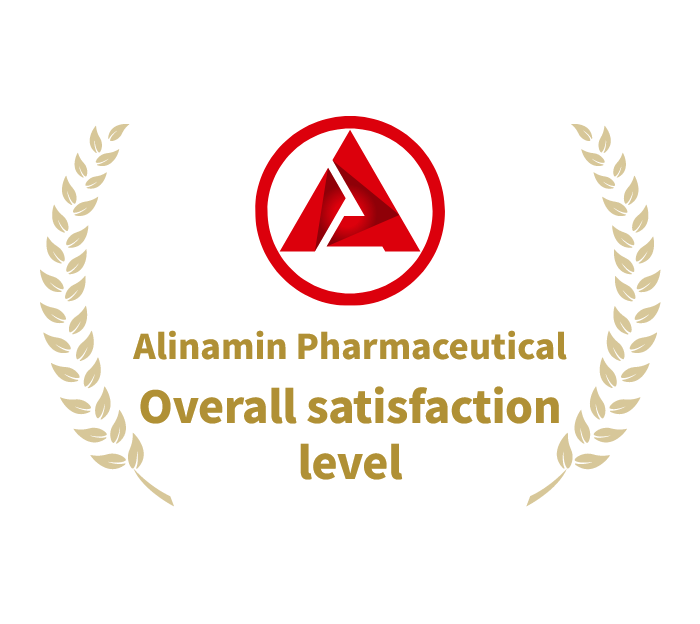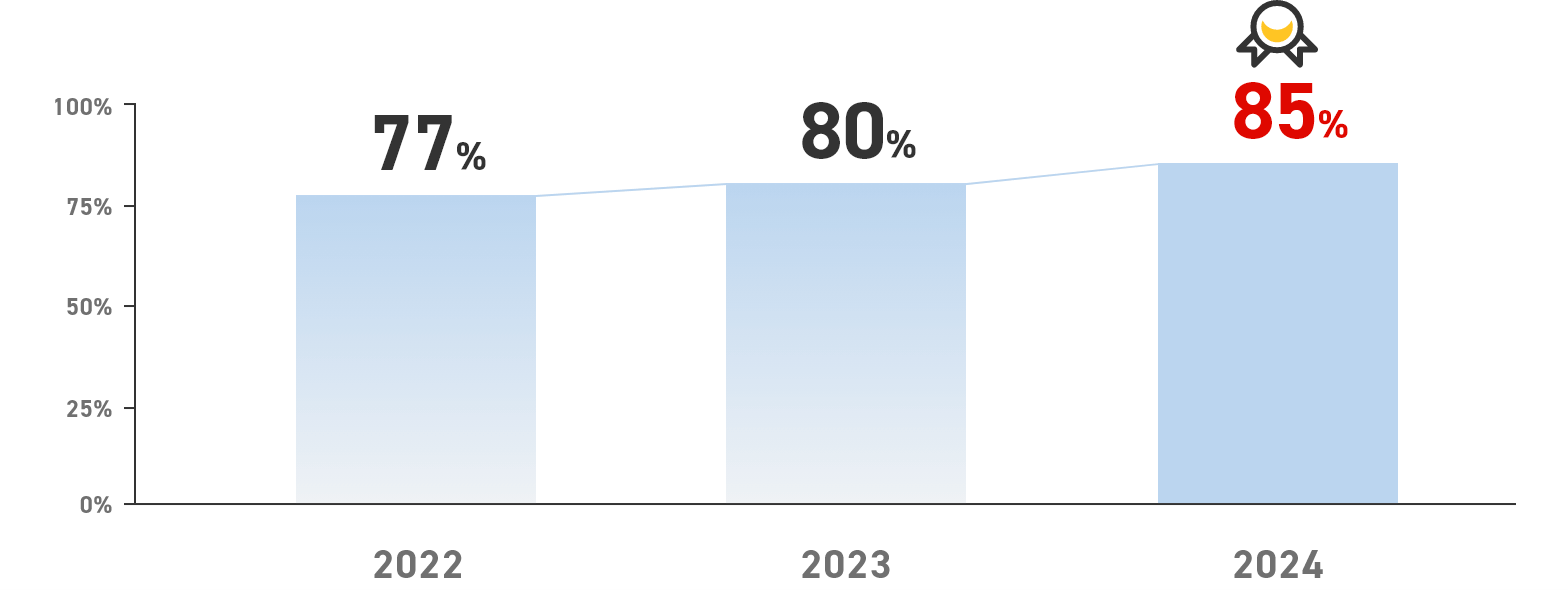Human Capital Management
The Ideal Employee
In order to fulfill our mission of supporting people's health by providing excellent, high-quality products and services and trustworthy information, we need to continue to respond quickly to the diverse healthcare needs of our customers while adapting to the environment surrounding the healthcare business.
In order to tackle these management issues, it is important to secure personnel who have a high sense of ethics in dealing with healthcare-related products, enjoy taking on new challenges, and can create change. We assess the strengths and weaknesses of each person while also emphasizing diversity in terms of experience and values, and strive to recruit and train personnel who ultimately can demonstrate their abilities in expanding our business.
Employee Education


At Alinamin Pharmaceutical, we believe that in order to increase job satisfaction and achieve our vision, it is important for both individuals and the Company to grow together. Based on our belief that 70% of personal growth comes from experience, we emphasize on-the-job experience and support growth through the accumulation of experience and skills by considering each individual's needs, such as challenging work, assignment to various projects, and transfers for training.
Furthermore, we attempt to maximize growth by combining feedback and coaching from superiors with training in a well-balanced manner. Our training system is based on the three pillars of rank-based, task-based, and on-demand (e-learning). By providing timely training according to job role (which is based on rank), training to improve business skills (which is based on tasks), and opportunities for self-motivated learning (which is provided on-demand via e-learning), we support the growth and development of each employee, as well as the development of human resources who enjoy taking on new challenges and creating change.
Rank-based, task-based, and on-demand (e-learning) training
| Position | Rank-based training | Task-based training | On-demand (self-development) |
||
|---|---|---|---|---|---|
| Leadership skills | Strategic thinking skills | Business skills | |||
| Managers | Newly appointed general managers: top managers |
|
|
Video service to teach various types of business knowledge such as
|
|
| Enhancing leadership | (Senior level)
|
(Senior level)
|
|||
| Newly appointed managers: practical management |
|||||
| Acting Manager/ Principal Researcher |
Support for promotion to executive-level management (for the candidates): Fundamentals of management and leadership | (Mid-level)
|
(Mid-level)
|
||
| Introduction to leadership | |||||
| General employees | Improving followership | Fundamental business skills | |||
|
|||||
| New employees: Orientation |
|||||
- *Training provided by individual departments is not included / Other training may be offered depending on the skills to be developed.
Staffing
When it comes to staffing, we decide on the allocation of personnel based on the needs of each department and human resource development, taking into account information on the career aspirations of subordinates and the need for transfers, which is ascertained at the annual talent review meeting held at the departmental level, as well as human resource evaluations from various perspectives (leadership potential, medium- to long-term performance, etc.). With regard to the personnel structure of the Company's organization, we conduct an annual survey of the number of people required for the business activities of the Company's line organization to ensure that business operations are carried out smoothly.
Internal Recruitment System
We have introduced an internal recruitment system to allow employees to have opportunities to take on new responsibilities of their own accord, thereby raising awareness of career development, supporting employees’ autonomous career development, and fostering a corporate culture that is full of a can-do mentality.
Personnel Evaluation System
Personnel evaluations are carried out once a year in April, and the primary evaluation of employees by their superiors is followed by a meeting of evaluators led by the head of the department in question, at which the level differences in the evaluations by superiors are confirmed (multi-faceted evaluation) and the evaluation is finalized. The personnel evaluation system consists of two evaluation axes: a performance evaluation that assesses the degree of achievement of the targets set at the beginning of the term and the degree of contribution to the company, and a competency evaluation that assesses “how the employee acted” in order to achieve the targets. The results of the individual evaluation form the basis for decisions on matters such as pay increases and bonuses.
Support for Group Companies
The Group views the effective use of human resources as an important measure for the entire Group, and we provide support for the overall human resource management of each company. In addition, each company provides a workplace environment where each employee can feel that they are growing within the Group and can play an active role with a sense of purpose. The Company's basic approach is to provide opportunities to capable and motivated employees, to appropriately evaluate their actions and results, and to translate these into their compensation. In order to make these things a reality, we support the introduction and operation of each company's remuneration and human resources development systems, and implement human resources policies that take into account the medium- to long-term development and career design of each employee.
Employee Awareness Surveys
The Group seeks to be a company that can achieve sustainable growth by improving employee engagement and creating an environment where employees can feel more fulfilled. For this reason, we conduct an employee awareness survey once a year to continuously monitor changes within the Company and take whatever action is necessary.
The survey is analyzed using the following ten categories: overall satisfaction, response to change, understanding of goals/strategies/direction, engagement, consumer perspective, ability to accept challenges/diversity, cooperation/teamwork, quality conversation (dialogue between superiors and subordinates regarding performance, goals, career, and skill development), compliance, and ability to work comfortably.
Overall satisfaction levels according to the employee awareness surveys over time

